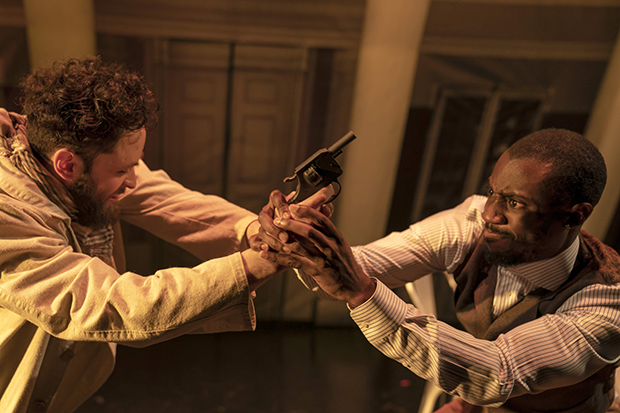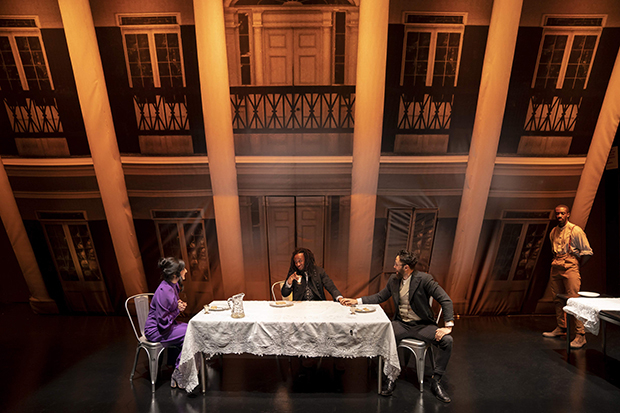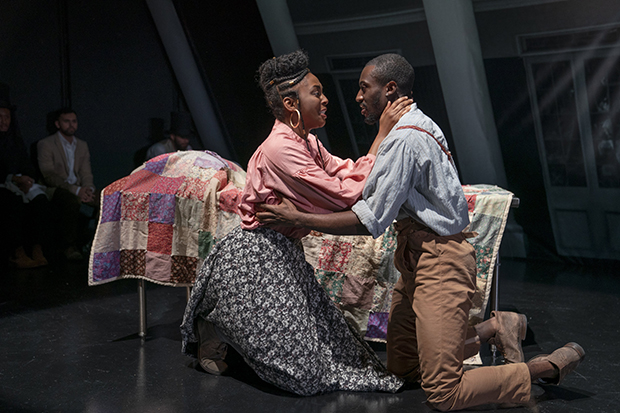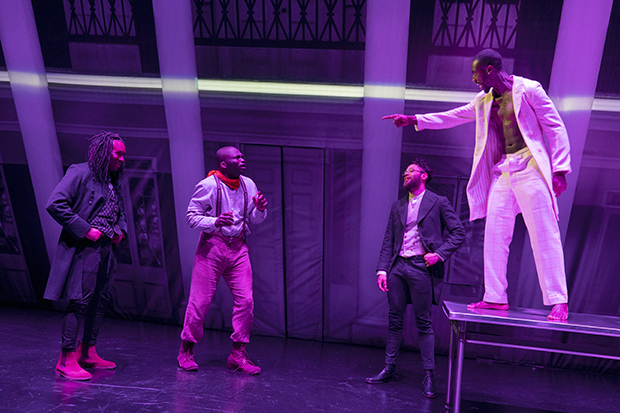Southern Promises Tells a Tale of Slavery in the Old South Without Any White Actors

(© Joan Marcus)
Is it possible to convey the horrors of white supremacy in antebellum Virginia without any white people? The nonwhite members of the Bats, the resident company of the Flea Theater, are giving it a try with a revival of Thomas Bradshaw's play Southern Promises. "People of color in America don't really have a tradition where we confront and investigate the legacy of slavery on our own terms," the actors explain in a prologue.
First staged with both white and black actors in 2008, Southern Promises was widely labeled a melodrama, albeit a particularly brutal one. There are still elements of that brutality in this revival, but they are mitigated by director Niegel Smith's inert production. It's not horrific, just tedious.

(© Joan Marcus)
The story begins in 1848. Isaiah (Darby Davis), the owner of a small plantation in Virginia, is about to die. He decides to free all of his slaves upon his death, and shares his wishes with his wife, Elizabeth (Brittany Zaken), and his favorite slave, Benjamin (Shakur Tolliver, mercifully giving one of the few understated performances in the show). Benjamin gleefully shares the news with his wife, Charlotte (Yvonne Jessica Pruitt). But when Isaiah dies, Elizabeth tells Benjamin he should just forget what her late husband said — he wasn't in his right mind. The arrival of Isaiah's brother, David (Jahsiah Rivera), and Elizabeth's brother, John (Marcus Jones), an anti-abolitionist minister, seems to herald the dawn of a less benevolent regime. The three swill pitchers of mint julep, like drunks at a politically incorrect brunch. None of the slaves are safe from their alcohol-fueled lust and wrath.
The Bats are a company of young volunteer performers, and Smith has not been able to curtail the overacting that comes naturally with such a troupe. In performing the show's numerous sex scenes, actors either grit their teeth while holding back tears, or roll their eyes in ecstasy while foaming at the mouth. Prayers are incanted with just as much sweaty vigor, which is strange since respectable mainline Protestants (which these landed gentry surely are) are never so theatrical. They're all performing the haunted-house version of a Virginia plantation; but what should horrify us is how thoroughly mundane it would have been for these slave owners to rape their slaves, separate their families, and then congratulate themselves on their superior Christian charity.

(© Joan Marcus)
Smith's staging is surprisingly sluggish considering how Bradshaw writes in short, staccato scenes that barely give you a chance to catch your breath. Jason Sherwood has designed a versatile yet evocative set to facilitate the 19 transitions in the script: A blown-up photograph of a plantation house looms over the stage like one side of a tent. Lighting designer Jorge Arroyo illuminates the windows on that photo to show which part of the house we're in. Those interiors are created with just three chairs and two tables, stainless steel furniture that looks like it was pillaged from a defunct Chipotle. It would all flow seamlessly, but Smith and sound designer Fabian Obispo have conspired to underscore each transition with classic rock, selections by Neil Young and Bob Dylan that might exist together on a playlist a college hipster presents to his heathen roommates raised exclusively on top 40. It's great to hear, but it gives the performers way too much time to marinate in their feelings.
All of this is unfortunate, because Bradshaw has significantly improved his script from the original, starting with the prologue. In that introduction, one of the actors shares that although he identifies as black, a recent DNA test revealed that he is of half European descent, half sub-Saharan African descent. "My ancestors threw tea into Boston Harbor," another chimes in, adding, "They also overthrew the white imperialists in Haiti, and beat drums and danced during the Congolese sunset." Bradshaw makes a strong argument that in order to overcome the injustices of the past, we have to embrace it in its messy entirety.

(© Joan Marcus)
The completely changed ending is also stronger in how it portrays the persistent allure of exploitation. Southern Promises is no longer about the runaway slave Benjamin "Box" Brown, who mailed himself to freedom in the North. It is now about a different man whose journey out of slavery leads him down an entirely different path. In many ways, this revision turns Southern Promises into a Horatio Alger story, one that depicts a dark, rarely spoken truth about the American dream: It is not enough to be free if one is not able to dominate others as evidence of that freedom. This is a Thomas Bradshaw happy ending — one that doesn't induce a smile, but a grimace.










